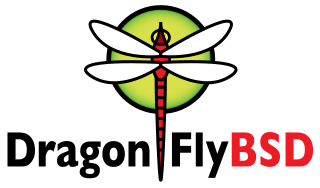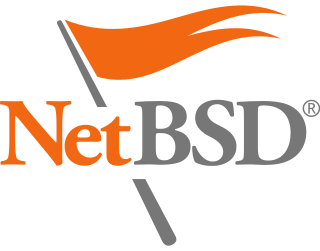The Unix file system (UFS) is a family of file systems supported by many Unix and Unix-like operating systems. It is a distant descendant of the original filesystem used by Version 7 Unix.

DragonFly BSD is a free and open-source Unix-like operating system forked from FreeBSD 4.8. Matthew Dillon, an Amiga developer in the late 1980s and early 1990s and FreeBSD developer between 1994 and 2003, began working on DragonFly BSD in June 2003 and announced it on the FreeBSD mailing lists on 16 July 2003.

XNU is the computer operating system (OS) kernel developed at Apple Inc. since December 1996 for use in the Mac OS X operating system and released as free and open-source software as part of the Darwin OS, which, in addition to being the basis for macOS, is also the basis for Apple TV Software, iOS, iPadOS, watchOS, visionOS, and tvOS.
spl is the name for a collection of Unix kernel routines or macros used to change the interrupt priority level. This was historically needed to synchronize critical sections of kernel code that should not be interrupted. Newer Unix variants which support symmetric multiprocessing now mostly use mutexes for this purpose, which is a more general solution, so multiple processors can execute kernel code at the same time.

The BSD Daemon, nicknamed Beastie, is the generic mascot of BSD operating systems. The BSD Daemon is named after software daemons, a class of long-running computer programs in Unix-like operating systems—which, through a play on words, takes the cartoon shape of a demon. The BSD Daemon's nickname Beastie is a slurred phonetic pronunciation of BSD. Beastie customarily carries a trident to symbolize a software daemon's forking of processes. The FreeBSD web site has noted Evi Nemeth's 1988 remarks about cultural-historical daemons in the Unix System Administration Handbook: "The ancient Greeks' concept of a 'personal daemon' was similar to the modern concept of a 'guardian angel' ... As a rule, UNIX systems seem to be infested with both daemons and demons."
Soft updates is an approach to maintaining file system metadata integrity in the event of a crash or power outage. Soft updates work by tracking and enforcing dependencies among updates to file system metadata. Soft updates are an alternative to the more commonly used approach of journaling file systems.
UNIX/32V is an early version of the Unix operating system from Bell Laboratories, released in June 1979. 32V was a direct port of the Seventh Edition Unix to the DEC VAX architecture.
There are a number of Unix-like operating systems based on or descended from the Berkeley Software Distribution (BSD) series of Unix variant options. The three most notable descendants in current use are FreeBSD, OpenBSD, and NetBSD, which are all derived from 386BSD and 4.4BSD-Lite, by various routes. Both NetBSD and FreeBSD started life in 1993, initially derived from 386BSD, but in 1994 migrated to a 4.4BSD-Lite code base. OpenBSD was forked from NetBSD in 1995. Other notable derivatives include DragonFly BSD, which was forked from FreeBSD 4.8.
In Unix and Unix-like operating systems, job control refers to control of jobs by a shell, especially interactively, where a "job" is a shell's representation for a process group. Basic job control features are the suspending, resuming, or terminating of all processes in the job/process group; more advanced features can be performed by sending signals to the job. Job control is of particular interest in Unix due to its multiprocessing, and should be distinguished from job control generally, which is frequently applied to sequential execution.
In BSD-derived computer operating systems and in related operating systems such as SunOS, a disklabel is a record stored on a data storage device such as a hard disk that contains information about the location of the partitions on the disk. Disklabels were introduced in the 4.3BSD-Tahoe release. Disklabels are usually edited using the disklabel utility. In later versions of FreeBSD, this was renamed as bsdlabel.

FreeBSD is a free and open-source Unix-like operating system descended from the Berkeley Software Distribution (BSD). The first version of FreeBSD was released in 1993 developed from 386BSD and the current version runs on x86, ARM, PowerPC and RISC-V processors. The project is supported and promoted by the FreeBSD Foundation.
GNU variants are operating systems based upon the GNU operating system. According to the GNU project and others, these also include most operating systems using the Linux kernel and a few others using BSD-based kernels.

Marshall Kirk McKusick is a computer scientist, known for his extensive work on BSD UNIX, from the 1980s to FreeBSD in the present day. He was president of the USENIX Association from 1990 to 1992 and again from 2002 to 2004, and still serves on the board. He is on the editorial board of ACM Queue Magazine. He is known to friends and colleagues as "Kirk".
In operating systems, a giant lock, also known as a big-lock or kernel-lock, is a lock that may be used in the kernel to provide concurrency control required by symmetric multiprocessing (SMP) systems.

The Berkeley Software Distribution or Berkeley Standard Distribution (BSD) is a discontinued operating system based on Research Unix, developed and distributed by the Computer Systems Research Group (CSRG) at the University of California, Berkeley. The term "BSD" commonly refers to its open-source descendants, including FreeBSD, OpenBSD, NetBSD, and DragonFly BSD.

Unix is a family of multitasking, multi-user computer operating systems that derive from the original AT&T Unix, whose development started in 1969 at the Bell Labs research center by Ken Thompson, Dennis Ritchie, and others.

NetBSD is a free and open-source Unix-like operating system based on the Berkeley Software Distribution (BSD). It was the first open-source BSD descendant officially released after 386BSD was forked. It continues to be actively developed and is available for many platforms, including servers, desktops, handheld devices, and embedded systems.

NextBSD was an operating system initially based on the trunk version of FreeBSD as of August 2015. It was a fork of FreeBSD which implemented new features developed on branches, but not yet implemented in FreeBSD. As of 2019, the website is defunct, with the last commits on GitHub dating to October 2019. The Wayback Machine captures of the website after December 15, 2017 are domain squatter pages, and as of March 17, 2021, the site is redirects to a fake "Apple Support" page.
The History of the Berkeley Software Distribution begins in the 1970s.








